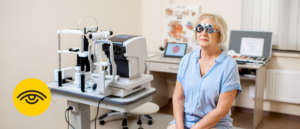

Elderly eye health – encouraging your parents to get their eyes checked
Just like physiotherapy and regular doctor appointments, elderly eye health is an important aspect to growing older. We know it can be difficult to encourage


Reading glasses are not the same as computer glasses.
A reading prescription is set at a closer focal length (approx. 40cm away from you). However, a computer prescription may be set just for your screen distance away (generally at an arm’s length) or incorporate changes in the power across the lens to provide more flexibility from a reading distance up to 4m away from you.
When it comes to the glasses you use at your workstation, you’ll need to put some thought into the products you pick. Where you may have two or more screens, you’ll benefit from having a specialised pair of glasses that provides you with a range of focal lengths. By looking through different parts of the lenses, you can easily view a variety of distances clearly. Simple eye movements operate this variable power design of lenses. This saved you having to physically move closer or further from your screens, which can cause strain.
The lens designs typically used for deskwork and screens are often known as extended reading lenses. As the name suggests, the design maximises reading and intermediate vision areas. The extended reading lenses provide wider intermediate and reading zones when compared to a multifocal lens design. A multifocal lens design will tend to provide a narrow intermediate zone and a small reading zone. This will suffice for everyday activities but many multifocal wearers find they must scan a lot with the intermediate portion of the lens at their screen and struggle to get comfortable reading vision. These individuals should consider an extended lens design.
More than one pair of glasses? That’s right!
One pair of glasses won’t work for every single activity that we do. It is just like shoes or clothes; where you don’t (shouldn’t!) wear joggers with a 3-piece-suit, nor would you go for a 10km run in thongs. Look after your eyes with the right equipment.
I have many patients that have;
Most of you will find that, as your sight changes with time, one pair of glasses cannot provide you with the best possible vision. You’ll need to specialise your eyewear for specific tasks. Have a chat to your local optometrist about what options would suit your needs best.
I had a 50-year-old man named Brendan come in for an examination.
Brendan was destroying his “nice” reading glasses by taking them to work every day. He’d take them in/out of his pocket all day long, restrict them to his pockets while out in the field, and then uses the same glasses back at his office computer.
Brendan and I had a chat about what he likes and dislikes with his current eyewear. We also spoke about what he does at work, and what he likes to do away from work. Brendan also noted that his left eye didn’t see as well as his right when it came to distance viewing. After testing and recommending the appropriate prescription, Brendan’s distance vision improved to beyond 6/6.
Brendan ended up ordering two different sets of glasses.
One was a pair of glasses to allow him to read plans when out in the field, as well as for use at his computer in the office. This pair of glasses had an anti-reflective coating on the front and back surface of both lenses making it beneficial for computer use under fluorescent office lights. This pair also featured a photochromatic coating which darkens in sunlight, for reading plans onsite and at the office.
Brendan does a lot of driving to various mine sites. So he decided that having a second pair of glasses – polarised multifocal sunglasses – would be beneficial. This will also help keep him safe, as he experiences tired eyes and squinting after driving.
Brendan returned his nice reading glasses to his home, keeps his safety glasses in his car, and loves his new polarised multifocal sunglasses for work and when he’s out fishing on his boat in his free time!
Another lens coating that is beneficial for use on digital devices is a blue light reducing anti-reflective coating. You can read more about blue light glasses here.


Just like physiotherapy and regular doctor appointments, elderly eye health is an important aspect to growing older. We know it can be difficult to encourage


Astigmatism is caused by the cornea or lens of the eye not being perfectly curved, resulting in blurred vision. How this affects you is varied


When you use your eyes to concentrate on something for a long period of time the common result is eye strain. Tired, sore, and itchy
Monday 9am–5:30pm
Tuesday 9am–5:30pm
Wednesday 9am–5:30pm
Thursday 9am–6:30pm
Friday 9am–5:30pm
Saturday Closed
Sunday Closed